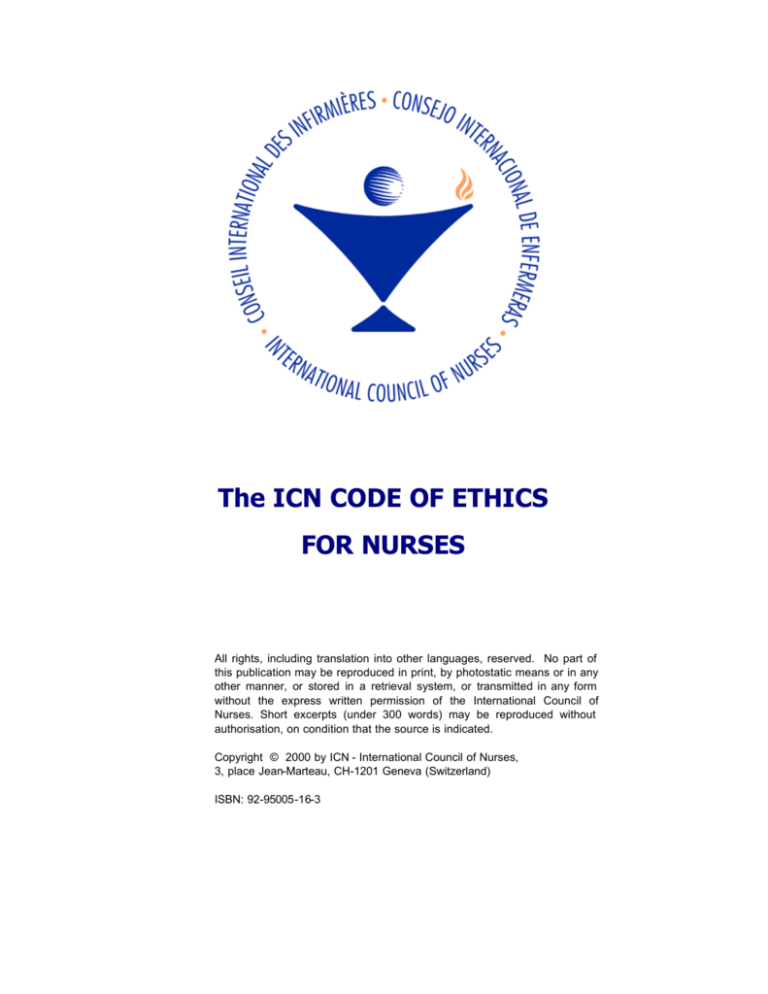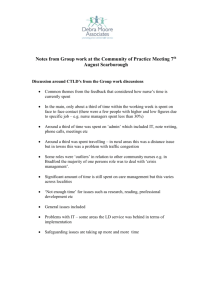The ICN CODE OF ETHICS FOR NURSES
advertisement

The ICN CODE OF ETHICS FOR NURSES All rights, including translation into other languages, reserved. No part of this publication may be reproduced in print, by photostatic means or in any other manner, or stored in a retrieval system, or transmitted in any form without the express written permission of the International Council of Nurses. Short excerpts (under 300 words) may be reproduced without authorisation, on condition that the source is indicated. Copyright © 2000 by ICN - International Council of Nurses, 3, place Jean-Marteau, CH-1201 Geneva (Switzerland) ISBN: 92-95005-16-3 2 The ICN Code of Ethics for Nurses An international code of ethics for nurses was first adopted by the International Council of Nurses (ICN) in 1953. It has been revised and reaffirmed at various times since, most recently with this review and revision completed in 2000. The ICN Code of Ethics is also available in French [pdf file] Spanish [pdf file] German. Preamble Nurses have four fundamental responsibilities: to promote health, to prevent illness, to restore health and to alleviate suffering. The need for nursing is universal. Inherent in nursing is respect for human rights, including the right to life, to dignity and to be treated with respect. Nursing care is unrestricted by considerations of age, colour, creed, culture, disability or illness, gender, nationality, politics, race or social status. Nurses render health services to the individual, the family and the community and co-ordinate their services with those of related groups. THE CODE The ICN Code of Ethics for Nurses has four principal elements that outline the standards of ethical conduct. Elements of the Code 1. Nurses and people The nurse’s primary professional responsibility is to people requiring nursing care. In providing care, the nurse promotes an environment in which the human rights, values, customs and spiritual beliefs of the individual, family and community are respected. The nurse ensures that the individual receives sufficient information on which to base consent for care and related treatment. The nurse holds in confidence personal information and uses judgement in sharing this information. The nurse shares with society the responsibility for initiating and supporting action to meet the health and social needs of the public, in particular those of vulnerable populations. The nurse also shares responsibility to sustain and protect the natural environment from depletion, pollution, degradation and destruction. 3 2. Nurses and practice The nurse carries personal responsibility and accountability for nursing practice, and for maintaining competence by continual learning. The nurse maintains a standard of personal health such that the ability to provide care is not compromised. The nurse uses judgement regarding individual competence when accepting and delegating responsibility. The nurse at all times maintains standards of personal conduct which reflect well on the profession and enhance public confidence. The nurse, in providing care, ensures that use of technology and scientific advances are compatible with the safety, dignity and rights of people. 3. Nurses and the profession The nurse assumes the major role in determining and implementing acceptable standards of clinical nursing practice, management, research and education. The nurse is active in developing a core of research-based professional knowledge. The nurse, acting through the professional organisation, participates in creating and maintaining equitable social and economic working conditions in nursing. 4. Nurses and co-workers The nurse sustains a co-operative relationship with co-workers in nursing and other fields. The nurse takes appropriate action to safeguard individuals when their care is endangered by a co-worker or any other person. 4 Suggestions for use of the ICN Code of Ethics for Nurses The ICN Code of Ethics for Nurses is a guide for action based on social values and needs. It will have meaning only as a living document if applied to the realities of nursing and health care in a changing society. To achieve its purpose the Code must be understood, internalised and used by nurses in all aspects of their work. It must be available to students and nurses throughout their study and work lives. Applying the Elements of the ICN Code of Ethics for Nurses The four elements of the ICN Code of Ethics for Nurses: nurses and people, nurses and practice, nurses and co-workers, and nurses and the profession, give a framework for the standards of conduct. The following chart will assist nurses to translate the standards into action. Nurses and nursing students can therefore: • • • • • • Study the standards under each element of the Code. Reflect on what each standard means to you. Think about how you can apply ethics in your nursing domain: practice, education, research or management. Discuss the Code with co-workers and others. Use a specific example from experience to identify ethical dilemmas and standards of conduct as outlined in the Code. Identify how you would resolve the dilemma. Work in groups to clarify ethical decision making and reach a consensus on standards of ethical conduct. Collaborate with your national nurses’ association, co-workers, and others in the continuous application of ethical standards in nursing practice, education, management and research. 5 Element of theCode # 1 : NURSES AND PEOPLE Practitioners and Managers Educators and Researchers National Nurses’ Associations Provide care that respects human rights and is sensitive to the values, customs and beliefs of people. In curriculum include references to human rights, equity, justice, solidarity as the basis for access to care. Develop position statements and guidelines that support human rights and ethical standards. Provide continuing education in ethical issues. Provide teaching and learning opportunities for ethical issues and decision making. Lobby for involvement of nurses in ethics review committees. Provide sufficient information to permit informed consent and the right to choose or refuse treatment. Provide teaching/learning opportunities related to informed consent. Provide guidelines, position statements and continuing education related to informed consent. Use recording and information management systems that ensure confidentiality. Introduce into curriculum concepts of privacy and confidentiality. Incorporate issues of confidentiality and privacy into a national code of ethics for nurses. Develop and monitor environmental safety in the workplace. Sensitise students to the importance of social action in current concerns. Advocate for safe and healthy environment. 6 Element of the Code # 2 : NURSES AND PRACTICE Practitioners and Managers Educator s and Researchers National Nurses’ Associations Establish standards of care and a work setting that promotes quality care. Provide teaching/learning opportunities that foster life long learning and competence for practice. Provide access to continuing education, through journals, conferences, distance education, etc. Establish systems for professional appraisal, continuing education and systematic renewal of licensure to practice. Conduct and disseminate research that shows links between continual learning and competence to practice. Lobby to ensure continuing education opportunities and quality care standards. Monitor and promote the personal health of nursing staff in relation to their competence for practice. Promote the importance of personal health and illustrate its relation to other values. Promote healthy lifestyles for nursing professionals. Lobby for healthy workplaces and services for nurses. Element of the Code # 3 : NURSES AND THE PROFESSION Practitioners and Managers Educators and Researchers National Nurses’ Associations Set standards for nursing practice, research, education and management. Provide teaching/learning opportunities in setting standards for nursing practice, research, education and management. Collaborate with others to set standards for nursing education, practice, research and management. Foster workplace support of the conduct, dissemination and utilisation of research related to nursing and health. Conduct, disseminate and utilise research to advance the nursing profession. Develop position statements, guidelines and standards related to nursing research. Promote participation in national nurses’ associations so as to create favourable socio-economic conditions for nurses. Sensitise learners to the importance of professional nursing associations. Lobby for fair social and economic working conditions in nursing. Develop position statements and guidelines in workplace issues. 7 Element of the Code #4 : NURSES AND CO-WORKERS Practitioners and Managers Educators and Researchers National Nurses’ Associations Create awareness of specific and overlapping functions and the potential for interdisciplinary tensions. Develop understanding of the roles of other workers. Stimulate co-operation with other related disciplines. Develop workplace systems that support common professional ethical values and behaviour. Communicate nursing ethics to other professions. Develop awareness of ethical issues of other professions. Develop mechanisms to safeguard the individual, family or community when their care is endangered by health care personnel. Instil in learners the need to safeguard the individual, family or community when care is endangered by health care personnel. Provide guidelines, position statements and discussion fora related to safeguarding people when their care is endangered by health care personnel. 8 Dissemination of the ICN Code of Ethics for Nurses To be effective the ICN Code of Ethics for Nurses must be familiar to nurses. We encourage you to help with its dissemination to schools of nursing, practising nurses, the nursing press and other mass media. The Code should also be disseminated to other health professions, the general public, consumer and policy making groups, human rights organisations and employers of nurses. Glossary of terms used in the ICN Code of Ethics for Nurses Co-operative relationship A professional relationship based on collegial and reciprocal actions, and behaviour that aim to achieve certain goals. Co-worker Other nurses and other health and non-health related workers and professionals. Nurse shares with society A nurse, as a health professional and a citizen, initiates and supports appropriate action to meet the health and social needs of the public. Personal health Mental, physical, social and spiritual well -being of the nurse. Personal information Information obtained during professional contact that is private to an individual or family, and which, when disclosed, may violate the right to privacy, cause inconvenience, embarrassment, or harm to the individual or family. Related groups Other nurses, health care workers or other professionals providing service to an individual, family or community and working toward desired goals.






